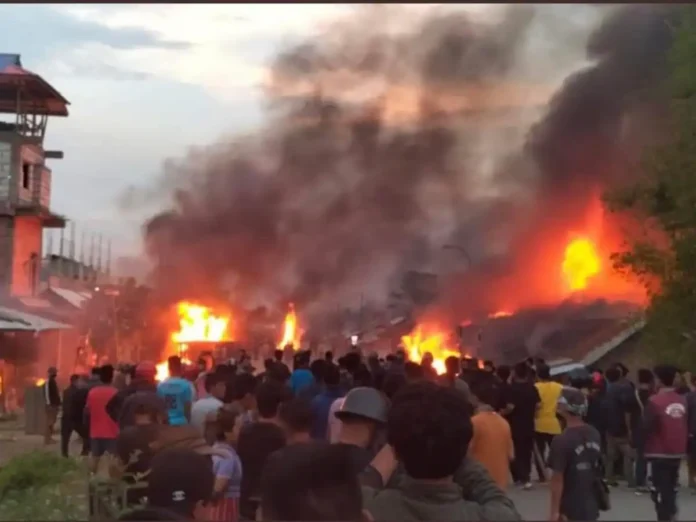The ongoing ethnic tensions and violent clashes between the Kuki and Meitei communities in Manipur have now spread to neighboring Meghalaya. As per reports, at least 16 people have been arrested in connection with the recent violence that erupted in the border town of Langpih.
The Kukis and Meiteis have a long-standing history of conflict over the control of Langpih, which is located in the West Khasi Hills district of Meghalaya, but lies on the border between Manipur and Meghalaya. The latest outbreak of violence is said to have been triggered by the construction of a temple in the area, which the Kukis claim was built without permission.
On May 3, clashes erupted between the two communities, leading to the death of one person and leaving several others injured. The violence reportedly escalated when a group of Kukis attacked a Meitei village, setting several houses on fire. The Meiteis responded by blocking the National Highway 2, which connects Meghalaya to the rest of the country, leading to disruptions in the movement of goods and people.
In response to the situation, the Meghalaya government has deployed additional security forces in the area to maintain law and order. The state police have also arrested at least 16 people in connection with the violence and have launched an investigation into the incident.
Meanwhile, political leaders and civil society groups have appealed for calm and urged the communities to resolve their differences through dialogue and peaceful means. They have also called on the state and central governments to take concrete steps to address the underlying issues that have led to the tensions between the two communities.
The Kukis and Meiteis are among the largest ethnic groups in the Northeast region of India, and have a complex history of inter-tribal conflicts and tensions. The roots of the current conflict in Manipur can be traced back to the colonial era, when the British created administrative divisions that favored the Meiteis over other communities.
The Kukis have long felt marginalized and excluded from the political process in Manipur, and have been demanding greater autonomy and recognition of their cultural and linguistic identity. The Meiteis, on the other hand, have accused the Kukis of encroaching on their land and resources, and have been pushing for greater control over the border areas.
The situation in Manipur and Meghalaya is a stark reminder of the challenges and complexities of ethnic relations in the Northeast region of India. The region is home to over 200 ethnic groups, each with its own distinct culture, language, and history. While the region has witnessed significant economic growth and development in recent years, the underlying social and political tensions remain unresolved.
The current violence in Manipur and Meghalaya underscores the urgent need for the state and central governments to address the root causes of the conflict, and to work towards building a more inclusive and equitable society. This will require sustained efforts to promote dialogue, reconciliation, and mutual understanding among the various communities in the region.
At the same time, it is important for all stakeholders to respect the rule of law and refrain from resorting to violence or taking the law into their own hands. The state and central governments must ensure that those responsible for the violence are held accountable and that justice is served to the victims.
The recent violence in Meghalaya is a stark reminder of the challenges and complexities of ethnic relations in the Northeast region of India. The situation calls for urgent action by the state and central governments to address the root causes of the conflict and to promote peace and reconciliation among the various communities in the region.


